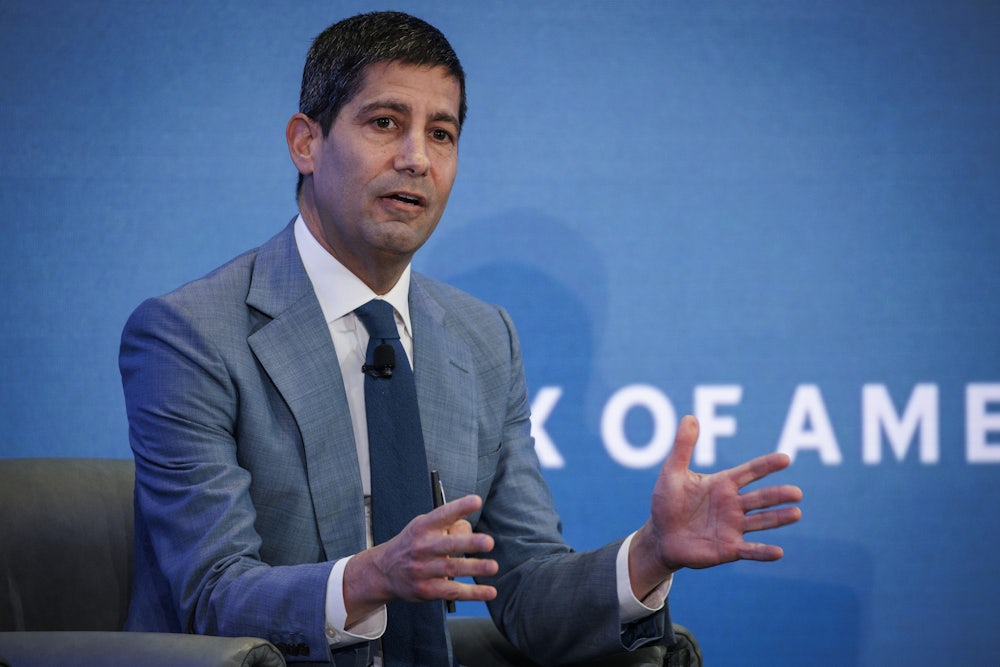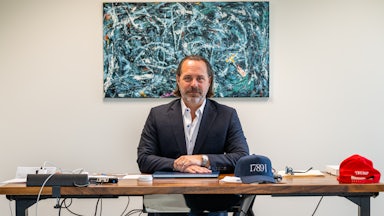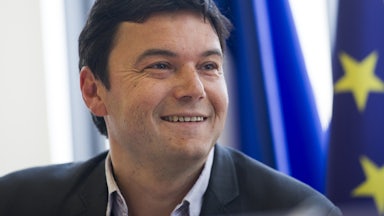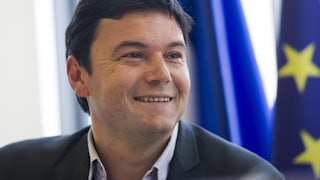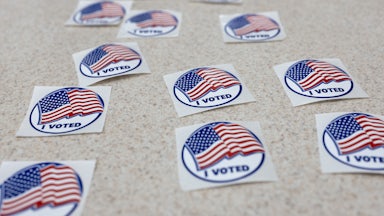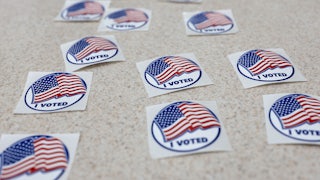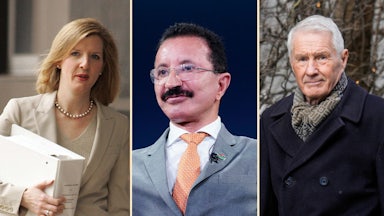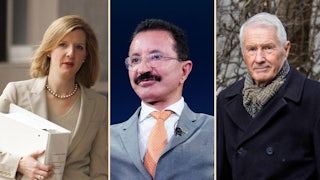Donald Trump doesn’t seem to give his Cabinet appointments much thought, often skipping the drudgery of FBI background checks and more informal internal vetting procedures. Is Tulsi Gabbard a Russian asset? Did Matt Gaetz have sex with a minor? Did Pete Hegseth commit sexual assault? If not, why did he pay off the alleged victim? And what about Hegseth’s white nationalist tattoo (“Deus Vult”)?
None of these questions weighs heavily on Trump’s mind because, as Steve Bannon explained to Maggie Haberman and Jonathan Swan of The New York Times, “Donald Trump is a blunt-force instrument applying blunt-force trauma to the system.” Unsuitability is the point. But there’s one Cabinet appointment to which Trump, quite uncharacteristically, appears to be giving considerable, even agonizing, deliberation: Who will be his treasury secretary?
Initially there were two candidates on Trump’s short list: Cantor Fitzgerald chief executive Howard Lutnick and Key Square Capital Management founder Scott Bessent. Rather than choose between them, Trump added two more: Apollo Global Management founder Marc Rowan and former Morgan Stanley financier and Fed governor Kevin Warsh. Then Trump reduced the pool to three by naming Lutnick (who reportedly was getting on Trump’s nerves) to run the Commerce Department instead.
None of these people is a blunt instrument. They are oligarchs in good standing, respectable members of the financial establishment. Yet still Trump can’t make up his mind. The novelty of Trump thinking carefully about, well, anything, is so striking that it warrants extended discussion.
Broadly speaking, Trump’s hesitation springs from the importance he gives to money. Apart from himself, money is the only thing that Trump ever thinks or cares about, and the Treasury Department is America’s Department of Money. Treasury’s powers extend well beyond control of the government’s own finances to the broader economy through the selling of government debt. As I’ve explained previously, debt is America’s most plentiful resource, generating $8.3 trillion annually. That’s four times the return on the country’s second-most-plentiful resource, crude oil. Only the Federal Reserve wields comparable power over the economy, and Trump won’t likely get a chance to appoint a new Fed chair until May 2026, when Jerome Powell’s term expires. Treasury is, as Politico noted earlier this week, “the one institution that Trump can’t afford to break,” and Trump knows it.
Presidents of both parties err on the side of caution whenever they appoint a treasury secretary, going back all the way to Alexander Hamilton (who, pace Lin-Manuel Miranda, was as beholden to the banks as Tim Geithner). The current officeholder, Janet Yellen, is the most left-wing treasury secretary since World War II, but that doesn’t tell you much; in February 2022 the left-liberal Robert Kuttner declared Yellen “the big disappointment of the Biden administration” because of her “profound status-quo bias” on regulatory matters. Yellen, like all her predecessors and whoever replaces her, is the Oval Office’s designated babysitter for Wall Street, tasked less with disciplining it (that’s more the job of the Securities and Exchange Commission, the Commodity Futures Trading Commission, and the Fed, none of which reports to the Oval Office) than with soothing its periodic squalls with a warm bottle of Enfamil.
Trump’s quandary is one he was spared last time he was elected, back in 2016, when he chose Steve Mnuchin for Treasury. Back then, Trump needed somebody who could sell Wall Street on tax cuts and reduced regulation. That wasn’t an especially hard task because to the extent that these policies screwed up the economy, they did so in ways that Wall Street doesn’t especially care about.
Mnuchin had to work a little harder selling Wall Street on protectionist trade policies, but only a little, because the protectionism was concentrated mostly on China, a notorious trade scofflaw. In the end, the main effects of Trump’s trade policies were to eliminate 245,000 American jobs and to shift manufacturing from Chinese plants in China to Chinese plants in Vietnam. But neither of these outcomes mattered to Wall Street.
It’s a bit different today. Trump needs a treasury secretary who can sell Wall Street on tax cuts, reduced regulation, and protectionism, but this time it’s protectionism on a colossal scale, with tariffs of 10 to 20 percent slapped onto every import plus a 60 percent tariff on all Chinese goods and a tariff of 25 percent to 100 percent on all goods from Mexico, which is an even bigger trading partner than China.
These tariffs would, it is widely agreed, tank the economy and usher in a bear market—and that’s before factoring in the worker shortage from Trump’s planned mass expulsion of undocumented aliens. Any Treasury nominee who understands the misery that Trump’s tariffs would create will resist them, and any Treasury nominee who doesn’t understand, or (more likely) pretends not to, will scare the living daylights out of Wall Street.
Wall Street is the only part of the American establishment that Trump respects. As Bloomberg’s Carmen Reinicke and Esha Dey wrote earlier this week, “The stock market is a way [Trump] keeps score.” It’s pretty much the only way. If you wonder why Trump didn’t talk about the stock market during the campaign, the reason is that the S&P 500 rose faster under President Joe Biden than at any time since 1945, except for the dot-com boom of the late 1990s, when it rose even faster (under another Democratic president). Unlike other economic statistics, stock indexes are really hard to lie about, because your audience can see what’s happening in their portfolios. (Then why did Trump voters think the economy was in trouble? Because nearly 40 percent of the population owns no stock, and among those who do all but the richest own very little.)
The Dow rose 1,508 points immediately after Trump’s election—a ringing endorsement of his victory. But that was only because traders assumed Trump didn’t really mean any of that nonsense about slapping tariffs on everything. As The Washington Post’s Jeff Stein and David Lynch wrote last month, Wall Street analysts “are hopeful that a stock market panic would dissuade or prevent Trump from carrying out his plans.”
Now the Trump bump is over. Knowing stock prices would fall back to earth, executives at major corporations sold off company stock at record levels. That was not a vote of confidence by our financial elite. Trump wants a treasury secretary who won’t condescend to him about tariffs yet can coax the S&P to rise higher. The reason that takes so much time is that such a person does not exist. Lutnik, for example, supported Trump’s tariffs so strongly that Trump’s self-appointed co-president Elon Musk publicly endorsed him. But after that, “the markets sold off,” Kyle Bass, chief investment officer at Hayman Capital Management, observed on Twitter, because investors were terrified that a true believer would actually get the job.
Of the three remaining candidates, Bessent would seem on paper the most plausible. He’s drunk the Kool-Aid on tariffs and, according to Bloomberg, he won the hearts of Trump’s advisers. But Bessent’s star faded after Musk called him a “business-as-usual choice” on Twitter. Also, Bessent’s employment by George Soros a decade ago makes him suspicious to the right. It might also hurt Bessent with the right that he’s gay.
Apollo’s Rowan cannily buttered Musk up by stating publicly that Musk “represents wholesale change, and I think we actually need wholesale change.” Rowan endeared himself to the right by leading the alumni charge against University of Pennsylvania president Liz Magill, which led eventually to her resignation. But Rowan didn’t help himself last month by complaining that the Fed risked overheating the economy if it cut interest rates too quickly; for all his denunciations of inflation under Biden, Trump is an inflation dove and is desperate for further rate cuts.
As I write, Warsh, the former Fed governor, is the Treasury candidate to beat. He’s young (54), and Trump thinks he’s handsome, which matters to an absurd degree. But Warsh is an inflation hawk too. The bond market rallied Monday after Warsh was identified as a Treasury candidate, and David Wessel of the Brookings Institution’s Hutchins Center told Bloomberg, “He’s very good at getting along,” which may be an ingredient the other candidates lacked. But I can’t find a public statement from either Warsh or Rowan endorsing Trump’s outrageous tariff plan, something Trump may require as a sort of loyalty oath.
In the end, Trump will need to decide how badly he wants to impose a ruinous economic policy on the country. We can’t rule out that he wants it very badly, if not from ideology (Trump has none) then from stubbornness and a loathing of respectable people who disagree and are willing to say so out loud. Trump will almost certainly end up hating whatever person he chooses for Treasury because that person won’t be able to persuade the markets that up is down and black is white and four fingers are really five. It’s a hopeless predicament. I can’t fathom why anybody would want the job.
